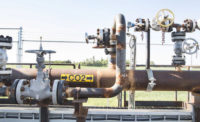With Canada’s carbon tax set to rise to C$170 per ton by 2030 from C$40 per ton now, oil and gas firms operating in Alberta's key energy hub are responding to a provincial government request for proposals to build new or larger underground carbon capture and storage projects.
Alberta’s push to create a massive carbon capture grid comes as Canada scrambles to slash greenhouse gas emissions 40-45% by 2030. A federal investment tax credit for carbon capture projects is anticipated..
Province energy officials now are reviewing about 48 different plans, aiming to invite a subset to submit final proposals in December, said Jerry Bellikka, Alberta energy ministry chief of state, in an email. The province said it seeks to create carbon capture hubs that will “provide open access to all emitters,” and not limited to carbon emissions of particular proponents and companies
Terming submissions confidential, the province declined to disclose proposer identities, but they "probably represent most of the major players in the region and some of the ambitious junior players,” says Mark Lea-Wilson, hydrogen hub lead at The Transition Accelerator, a Canadian non-profit business advisor on net-zero and climate change approaches.
Carbon Storage Approaches
Pembina Pipeline Corp. in June announced a joint proposal with TC Energy to lease underground space from the province to build a large carbon capture and storage hub.
Pembina proposed retrofitting parts of its existing pipeline network to pump captured carbon to a Fort Saskatchewan, Alberta reservoir, which it said is large enough to hold 2 billion tons of CO2, representing “many decades of sequestration capacity.”
Royal Dutch Shell also announced in July a plan to capture and store up to 300 million tons of carbon from its refinery and chemical plant near Edmonton over the life of its CCS project. In its first phase, it would capture and store up to 750,000 tons of carbon annually.
Shell said it will make a final investment decision on the facility by 2023, with both it and Pembina set to launch initial phases of their respective projects by 2025.
Shell and U.S. independent power producer Silicon Ranch, in which the oil company holds an ownership stake, also plan to develop a $100-million solar project on a 414-acre site to provide up to 20% of the facility’s power when it operates in 2023, according to published reports.
Meanwhile, Pembina CEO Mike Dilger has approached executives linked to rival proposals about combining forces on a single carbon capture and storage project. "A single, large carbon capture program at scale is by far the most sensible way to do things," he told Reuters, terming such an approach "a more cost-effective solution."
Building Synergies?
The Transition Accelerator’s Lea-Wilson noted basic synergies in such links.
Pembina could use its pipeline to funnel carbon from Shell’s refinery, and from oil facilities of members of the Oil Sands Pathways, a group made up of energy producers Canadian Natural, Cenovus Energy, ConocoPhillips Canada, Imperial, MEG Energy and Suncor Energy.
“It would make sense that Shell’s Polaris project utilizes the infrastructure Pembina is providing,” Lea-Wilson said.
Whether Alberta push for a few major underground carbon storage hubs, or a series of them across the province, will produce sufficient economic returns remains to be seen, says Sander Duncanson, a partner at Toronto law firm Osler, Hoskin & Harcourt LLP, who works with energy sector clients.
Profit margins are thin, and paying another operator, such as a pipeline operator, to funnel carbon to an underground storage hub would be an added expense, he says.
For some oil and gas operators, it may make more sense to store carbon on site, although that isn’t possible for companies working in Alberta's oil sands region, where geological conditions preclude building underground carbon storage complexes, Duncanson says.
“There is a lot of interest – that’s for sure – it’s too early to say how many of these projects are actually going to proceed,” he says. “The economics around carbon capture are still challenging.”
Alberta energy regulators plan to announce “successful proponents” of its program in the first quarter of next year, says an energy ministry spokesperson, who did not say how many proposals will be selected. None will receive any government funding.





